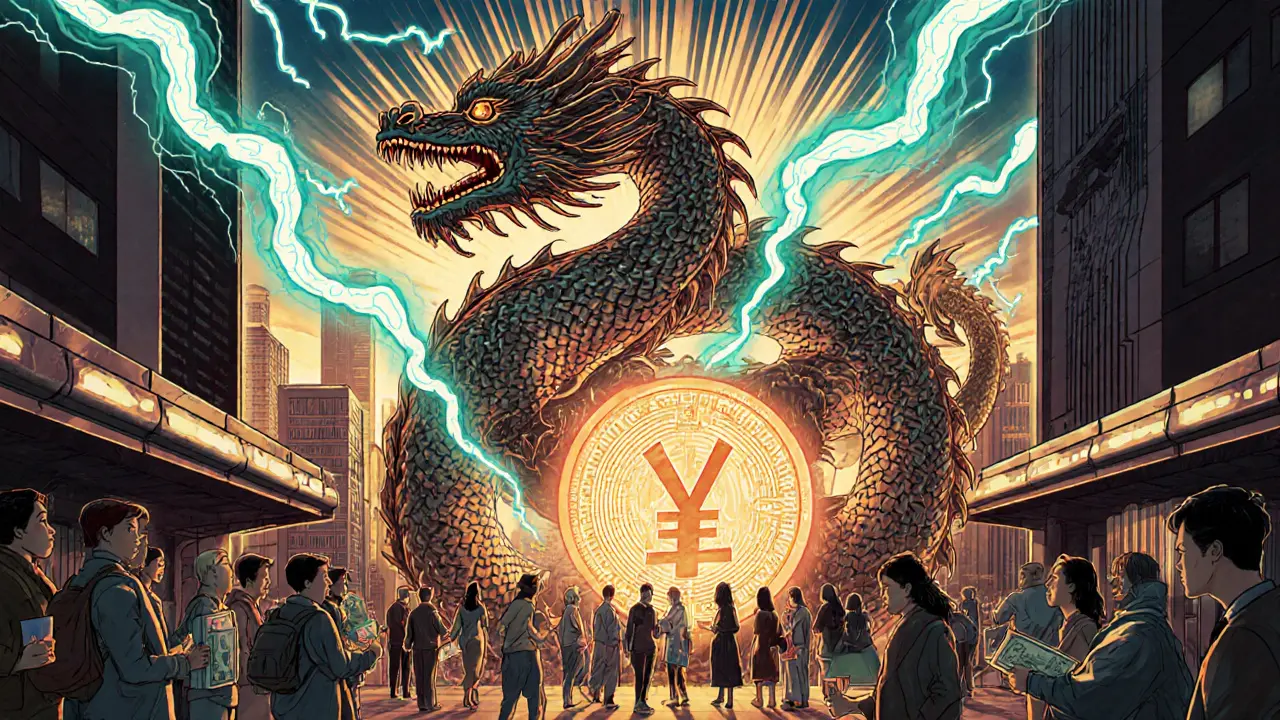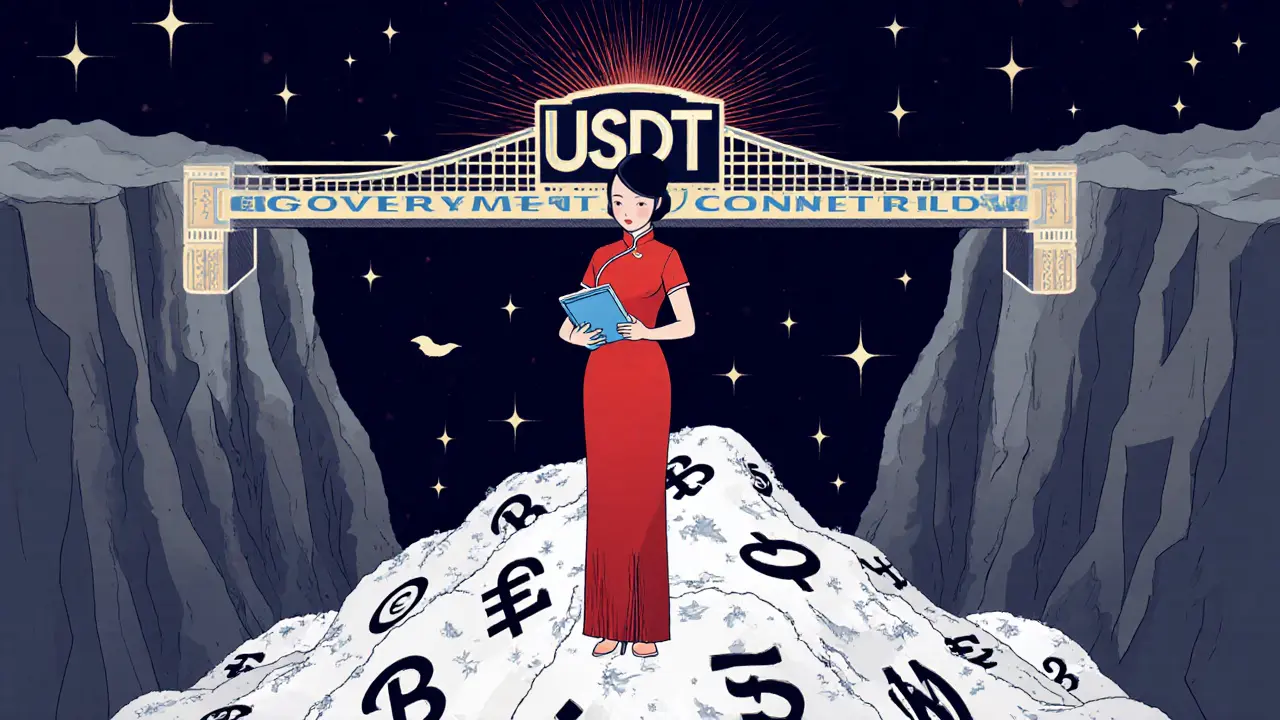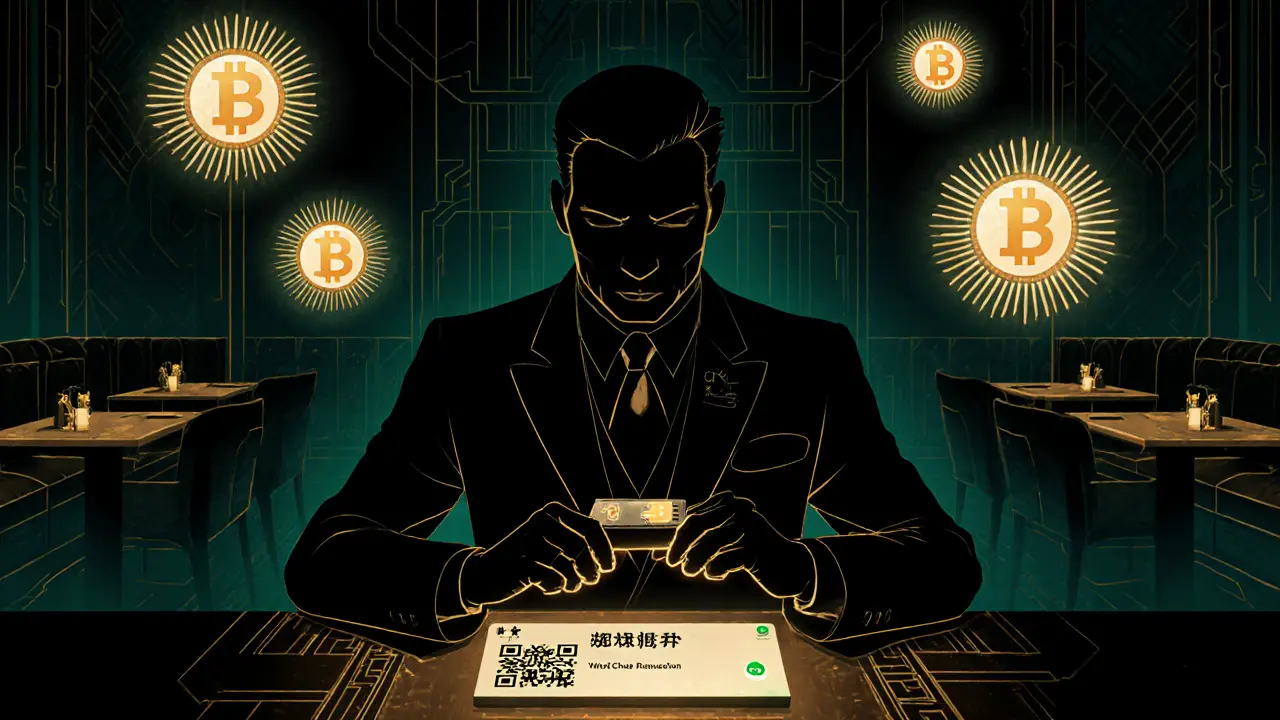China officially banned cryptocurrency trading and mining in 2021. Banks can’t touch it. Exchanges like Binance and Coinbase are blocked. Yet, in the shadows, Chinese traders moved $86.4 billion in crypto between July 2022 and June 2023. That’s more than Hong Kong, where crypto is legal. It’s not a glitch. It’s a system.
What’s Actually Illegal?
The Chinese government didn’t ban holding Bitcoin or Ethereum. You can keep them in your wallet. But if you try to buy, sell, or trade them inside China - through an exchange, a broker, or even a friend - you’re breaking the law. The People’s Bank of China (PBOC) made it clear: no financial institutions can support crypto. No bank transfers. No payment processing. No crypto ATMs. But here’s the twist: Chinese courts have ruled that cryptocurrencies are “legal property.” That means if someone steals your Bitcoin, you can sue for damages. The state doesn’t recognize it as money, but it won’t let you be robbed without recourse. That contradiction is why the underground market thrives. People aren’t just gambling - they’re protecting wealth.How Do People Still Trade?
You won’t find a crypto exchange app on your Chinese phone. But you’ll find people using WhatsApp, Telegram, and WeChat groups to connect. Traders use peer-to-peer (P2P) platforms like LocalBitcoins or OTC desks that operate through Hong Kong. They don’t need a Chinese bank account to send money - they use family members abroad, trusted brokers, or even cash handoffs in border cities like Shenzhen. Virtual Private Networks (VPNs) are everywhere. Traders use multiple layers - commercial services, private proxies, even encrypted mesh networks - to bypass the Great Firewall. Some set up shell companies in Hong Kong to receive crypto payments legally, then transfer funds back to China through trade invoices or fake service contracts. Stablecoins like USDT are the secret weapon. Because they’re pegged to the U.S. dollar, they’re easier to move across borders and less volatile than Bitcoin. Traders buy USDT with yuan through OTC brokers, then use it to trade Bitcoin or Ethereum on international platforms. When they want cash back, they sell USDT to another trader in China - often in person, in a café or parking lot - and get yuan in hand.Who’s Doing This?
It’s not just hobbyists. The average transaction size in China’s underground market is nearly double the global average. Around 3.6% of trades globally are between $10,000 and $1 million. In China, it’s over 6%. These are serious investors - small business owners, tech employees with stock options, even retired civil servants. Why? Because China’s stock market collapsed. The CSI 300 index fell 35% over three years. Corporate earnings have missed forecasts for ten straight quarters. The government pumped 2 trillion yuan into equities to stabilize things - but trust is gone. People don’t believe in the system anymore. Crypto isn’t a side hustle. It’s a survival strategy.The Risks Are Real
Just because you can trade doesn’t mean it’s safe. The biggest danger? Enforcement changes overnight. In May 2025, rumors swirled that personal crypto holdings were being outlawed. While unconfirmed, the panic was real. If the government decides to crack down harder - and they can - your wallet could be frozen. Your assets seized. Your name flagged. OTC brokers aren’t regulated. If someone takes your yuan and disappears, you have no recourse. No chargeback. No customer service. No legal protection. You’re on your own. VPNs get blocked. Platforms get shut down. Bank accounts linked to crypto activity get closed - even if you didn’t trade yourself, just receiving a payment from a friend can trigger a red flag. And then there’s the psychological toll. Constant fear. Checking news feeds every hour. Worrying if your next message on WeChat will be the one that gets you in trouble. It’s not just financial risk. It’s emotional exhaustion.
Why Won’t It Go Away?
China wants control. That’s why they built the digital yuan - a state-controlled digital currency that tracks every transaction. They don’t want decentralized money. They want digital surveillance. But people want freedom. They want returns. They want to move money without permission. The underground market isn’t going anywhere. It’s too big. Too embedded. Too necessary for too many people. Even if the government shuts down one OTC network, three more pop up. If they block one VPN provider, traders switch to another. The system adapts because the need is too strong. Shanghai regulators are now talking about regulating stablecoins. That’s a sign. Not of a crackdown - but of a possible shift. Maybe they’ll allow controlled access through licensed platforms. Maybe they’ll let people hold stablecoins but ban volatile coins. The door might crack open - but it won’t swing wide.What’s Next?
China’s stance on crypto isn’t just about finance. It’s about power. Can a state control money in the digital age? The underground market says no. Not completely, anyway. For now, traders will keep using Hong Kong accounts, encrypted apps, and cash handoffs. They’ll keep buying USDT. They’ll keep avoiding detection. The scale won’t shrink - not while stocks keep falling and the digital yuan offers no real yield. The government can ban exchanges. They can jail miners. But they can’t ban human desire for better returns. And as long as that exists, crypto will find a way - even in the most tightly controlled economy on Earth.What Happens If You Get Caught?
If you’re caught trading crypto in China, the punishment depends on how big you are. For a regular person using a P2P app to buy $5,000 in Bitcoin? You might get a warning. Your account could be frozen. Your phone might be inspected. But if you’re running an OTC desk, managing multiple wallets, or moving over $100,000 a month? That’s commercial activity. That’s illegal under PBOC rules. You could face fines, asset seizure, or even criminal charges. There have been cases where people were sentenced to prison for operating unlicensed crypto exchanges. There’s no public record of how often this happens - the government doesn’t publish enforcement stats. But whispers in trader forums suggest that 2024 and 2025 saw a rise in investigations targeting OTC brokers and VPN resellers.
Is There a Legal Way?
Technically, no. There’s no legal exchange in mainland China. No licensed broker. No bank that will process crypto payments. The only legal path is to move outside China - to Hong Kong, Singapore, or another country with open crypto markets. But that requires residency, bank accounts, and paperwork most people don’t have. Some high-net-worth individuals use offshore trusts or Hong Kong-based companies to hold crypto legally. But that’s out of reach for 99% of Chinese citizens. So for most, the only “legal” option is to hold - not trade. But holding without trading is like owning a car but never driving it. It doesn’t solve the problem.How Do Traders Stay Safe?
Experienced traders follow a few hard rules:- Never use your real name on P2P platforms - use aliases, fake IDs, and burner phones.
- Keep crypto in cold wallets - never on exchanges, even offshore ones.
- Use multiple VPNs, never the same one twice.
- Only trade with people who have 5+ years of verified history on forums.
- Never keep more than you can afford to lose - because you can lose it all, and no one will help you.
- Use stablecoins as your bridge - not Bitcoin or Ethereum.
What About the Digital Yuan?
China’s digital yuan (e-CNY) is the government’s answer to crypto. It’s not decentralized. It’s not anonymous. Every transaction is logged. The state can freeze it. Track it. Limit how much you can spend. But here’s the irony: the digital yuan doesn’t offer higher returns. It doesn’t let you invest globally. It doesn’t protect against inflation like Bitcoin might. So while the government pushes e-CNY as the future of money, millions of Chinese are quietly betting on something else - something they can’t control, but that gives them real value. The digital yuan is a tool of control. Crypto is a tool of escape.Can China Ever Allow Crypto Again?
Maybe - but not like the West. China won’t open its markets to Bitcoin as an asset. But it might allow stablecoins under strict licensing - like a government-approved version of USDT, issued by state-backed banks, with KYC, limits, and tracking. That’s already happening in pilot zones like Shanghai. Regulators are testing frameworks for “regulated digital assets.” It’s not crypto as we know it. It’s crypto on China’s terms. If that happens, the underground market might shrink - but it won’t disappear. Because the people who use it aren’t just chasing profit. They’re chasing autonomy.Is it illegal to own Bitcoin in China?
Yes and no. Owning Bitcoin or Ethereum isn’t explicitly illegal - Chinese courts have recognized crypto as “legal property.” But trading, exchanging, or using it to pay for goods or services is banned. You can hold it, but you can’t move it legally inside China.
Can Chinese banks process crypto payments?
No. Since 2021, the People’s Bank of China has banned all financial institutions - including banks, Alipay, and WeChat Pay - from handling any cryptocurrency-related transactions. Any bank account linked to crypto activity may be frozen.
Why do Chinese traders use stablecoins like USDT?
Stablecoins like USDT are pegged to the U.S. dollar, making them less volatile than Bitcoin. They’re easier to move across borders, used as a bridge between yuan and crypto, and accepted by most international exchanges. Traders buy USDT with cash or P2P, then trade it for other cryptos overseas.
What happens if the Chinese government cracks down harder?
If enforcement increases, traders face asset seizures, bank account freezes, fines, or even criminal charges - especially if they’re running OTC operations. VPNs get blocked faster, P2P platforms disappear, and trust among traders drops. But the demand for crypto won’t vanish - it’ll just go deeper underground.
Is Hong Kong still a safe place for Chinese crypto traders?
Yes - for now. Hong Kong allows legal crypto trading and has open banking. Many Chinese traders use Hong Kong bank accounts, set up shell companies, or rely on family there to access global exchanges. But China is increasing pressure on cross-border financial flows, so even Hong Kong’s position could tighten in the future.
How much crypto is traded in China underground each year?
Between July 2022 and June 2023, Chinese traders conducted an estimated $86.4 billion in crypto transactions, according to Chainalysis. That’s roughly 3% of China’s annual GDP - and more than the entire legal crypto market in Hong Kong during the same period.




Hamish Britton
November 15, 2025 AT 07:02Man, this is wild. I never thought I'd see a country ban crypto and still have $86B flowing underground. It's like trying to stop water with a sieve. The fact that courts call it 'legal property' but banks can't touch it? That's not policy-that's cognitive dissonance on a national scale. People aren't rebels here. They're just rational actors in a broken system.
Rachel Anderson
November 16, 2025 AT 07:03Oh, sweet Jesus, this is the most poetic tragedy of the digital age. 🎭 The state builds a gilded cage of the digital yuan-cold, tracked, sterile-and the people? They’re whispering Bitcoin in parking lots like it’s sacred scripture. USDT isn’t currency, it’s a hymn. A hymn sung in WeChat groups, behind five layers of VPNs, by retirees who’ve lost faith in pensions and stocks. This isn’t crypto. This is existential resistance.
Robert Astel
November 16, 2025 AT 11:50so like, i was reading this and i just had to say-wow. i mean, think about it. china wants total control, right? but people just wanna keep their money safe from inflation and corruption. so they use usdt like a secret language. and the craziest part? they’re not even doing it for fun. they’re doing it because their government literally made the economy feel like a sinking ship. and now they’re swimming with crypto life preservers. also, i think the digital yuan is kinda creepy, like big brother but with more apps. lol. anyway, hope you’re all safe out there, traders. 🙏
Andrew Parker
November 17, 2025 AT 01:33THE SYSTEM IS DESIGNED TO BREAK YOU. AND YET-YOU STILL SHOW UP. 💔 Every time you open a burner phone. Every time you meet a stranger in a café to hand over cash for USDT. Every time you pray your VPN doesn’t die at 3 a.m. You’re not trading crypto-you’re performing an act of spiritual defiance. The state thinks it owns your money. But you? You own your dignity. And that’s why they’ll never win. Even if they jail you. Even if they freeze your wallet. You still chose freedom. And that’s the most powerful thing in the world. 😭
Kevin Hayes
November 17, 2025 AT 05:29The paradox here is not economic-it’s epistemological. The Chinese state acknowledges crypto as property under civil law while denying it as monetary instrument under financial law. This creates a legal vacuum where rights exist without remedies. The underground market thrives not because of technological ingenuity, but because the state’s own contradictions have rendered its regulatory architecture inert. The digital yuan, by contrast, is not an alternative-it is the culmination of control. It does not empower; it surveils. And in that asymmetry, the people have found their only viable counter-institution: silence, anonymity, and cash handoffs.
Katherine Wagner
November 18, 2025 AT 13:40So owning crypto is legal but trading it isn’t? That’s like saying owning a gun is fine but firing it is a crime. Who even writes these laws? And why do they think people won’t just… keep doing it anyway? 🤷♀️
ratheesh chandran
November 19, 2025 AT 18:58bro i live in delhi and i see same thing here with people using binance p2p with uae bank accounts. china not alone. people want freedom. government want control. its ancient story. but usdt? yes usdt is king. i buy usdt from friend, send to binance, buy btc, sell in usa, get usd. simple. no bank. no paper. no questions. if you scared, you poor. if you smart, you trade. 🤫
Hannah Kleyn
November 20, 2025 AT 07:19It’s fascinating how the underground market isn’t just a workaround-it’s an evolution. People aren’t just circumventing rules, they’re building a parallel financial ecosystem with its own norms, trust systems, and survival tactics. The fact that traders rely on years-long forum reputations instead of KYC? That’s organic social capital forming in real time. And stablecoins? They’re not just a bridge-they’re the new lingua franca of financial resistance. I wonder if this model will spread to other authoritarian economies. Probably. The need for autonomy doesn’t care about borders.
gary buena
November 21, 2025 AT 04:16lol at the part where they say 'silence is the best defense'-as if anyone in 2025 can stay silent. someone’s gonna post a pic of their usdt wallet on instagram and tag #cryptochina and then boom, cia gets involved. but seriously, this is one of the most real things i’ve read all year. the digital yuan is like a smartwatch that tells you how many steps you took… and also who you bought coffee from. no thanks.
Vanshika Bahiya
November 21, 2025 AT 10:47For anyone thinking of trying this: start small. Use a burner phone. Never link your real email or ID. Stick to USDT. Trade only with people who’ve been on Reddit or Telegram for over 5 years-check their history. Cold wallet only. And if you’re ever asked about it, say you don’t know anything. No drama. No explanations. Trust your gut more than any app. I’ve helped 12 people in my city do this safely. You can too. Stay smart, stay quiet.
Albert Melkonian
November 22, 2025 AT 03:09One cannot help but admire the quiet resilience of the Chinese crypto trader. In a society where conformity is institutionalized, these individuals have, through deliberate restraint and technical diligence, carved out a space of personal sovereignty. The digital yuan, while technologically sophisticated, represents a zero-sum vision of financial order. In contrast, the underground market embodies a decentralized ethos of self-determination. It is not merely an economic phenomenon-it is a moral one. The state may control the ledger, but it cannot control the will.
Kelly McSwiggan
November 22, 2025 AT 19:13Let’s be real: this is just rich people with offshore accounts pretending they’re revolutionaries. The ‘average trader’ moving $10k? Probably a tech bro with a Hong Kong bank account and a fake ID. Meanwhile, the actual working class? They’re stuck with e-CNY and 0.3% interest. This isn’t resistance-it’s privilege with a VPN. Also, ‘emotional exhaustion’? Honey, you’re risking your freedom for a speculative asset. Try having a real job for once.
Byron Kelleher
November 23, 2025 AT 20:13just wanted to say thank you for writing this. it’s easy to think of crypto as just gambling or tech hype, but this… this is about people trying to hold onto something real in a world that feels like it’s crumbling. i don’t know if i’d have the guts to do what these traders are doing, but i respect it. honestly, if my country started locking down my money like this, i’d be in a wechat group too. stay safe out there, everyone.
Cherbey Gift
November 24, 2025 AT 14:49China is not banning crypto… they are banning *trust*. They banned the system that was supposed to protect people’s wealth-so people built their own. USDT is not money, it’s a prayer. The VPN is not a tool, it’s a cathedral. And the cash handoff? That’s communion. They don’t need permission to believe. They just need a shadow, a handshake, and a little hope. And you know what? That’s more powerful than any digital yuan.
Anthony Forsythe
November 26, 2025 AT 06:44Let us not mistake this for mere financial evasion. This is the birth of a new civil society-one forged not in legislatures or town halls, but in encrypted Telegram threads, in the dim glow of midnight laptop screens, in the trembling hands of a retiree exchanging cash for USDT in a Shenzhen parking lot. The state may control the currency, but it cannot control the conscience. The blockchain is not merely a ledger-it is a mirror. And what it reflects is not technology, but the unquenchable human yearning for autonomy. Every transaction is a silent scream: I am not yours. I am not your data point. I am not your tax. I am me. And I will not be erased.